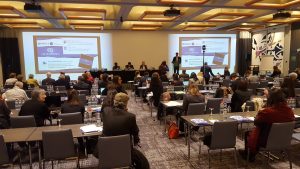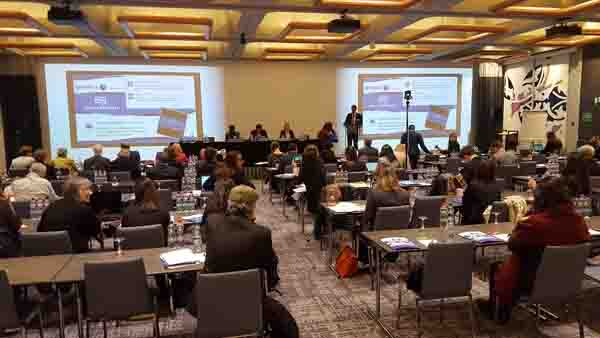By Sami Zaptia.

Brussels, 26 January 2017:
Within the framework of the United Nations Alliance of Civilizations’ (UNAOC) #SpreadNoHate initiative and in the context of rising populism in Europe and across the world, the UNAOC and the European Union External Action Services (EUEA) organized a one-day symposium on ‘‘hate speech against migrants and refugees in the media’’ in the Belgian capital Brussels today. Libya Herald was invited to participate in the symposium.
The migrant/refugee flow from Syria into Europe, the weak Libyan state, the effects of populism, the Brexit vote, the election of Donald Trump and his post-truth, build-the-wall narrative were seen as having contributed to an anti-migrant narrative in Europe and the USA.
It was agreed that while the media may be guilty of echoing and multiplying negative populist narratives, it was felt that it is not the creator of such a narrative. Populism prefers to blame others, foreigners, refugees and migrants for political local problems and is often misused by politicians to gain easy votes and support.
It was stressed that this narrative needed to be countered by the media with an alternative narrative and media literacy that encourages critical thinking by politicians and the electorate. The public should not be passive receivers of facts and needs to recognize propaganda and straight forward lies. Better fact-checking mechanisms need to be used to provide better information to the public.
The special role of social media in creating a dominant narrative was recognized and it was stressed that social media space needed to be filled with quality/factual compelling content to counter sensationalism and often very attractive, but factually incorrect news and narratives.
In order to counter these narratives, it was imperative to understand how social media algorithms work in multiplying populist and factually incorrect news.
With regards to Libyan media and hate speech against migrants and refugees in the media, I pointed out that independent media in Libya is a new post-Qaddafi phenomenon.
Libya and Libyans hold two contradictory views on illegal migrants. On the one hand, Libya cannot survive without the millions of migrant labourers that keep the country working across all sectors. Yet, migrants are often blamed for criminality, drugs and alcohol trade.
Today, the post 2011 revolution Libya is a weak state with open borders and little law enforcement dominated by widespread weapons and militias. Migrants are a pawn of corrupt militias and people smugglers as part of a vicious cycle of illicit trade, lawlessness and disorder. The empowerment of the migrant-smuggling militias extenuates the weakness and stability of the Libyan state.
Libyan media is currently weak and struggling to survive within the country, reflecting the status of the Libyan state. It is often criminally and politically targeted in attacks, kidnappings and assassinations. Independent media needs the protection of a strong state’s security apparatus, law enforcement and judiciary as a deterrent against its enemies.
While on paper Libyan media has often set sets of ethics for its operation, the security vacuum within the country makes it difficult to enforce.
In reality, Libyans and Libya see the migration flows across the Mediterranean Sea from its shores as a European problem, with Libya simply a transit point. With Libya’s numerous social. Economic, political and security problems, migration ranks very low on the agenda of Libyan media.









